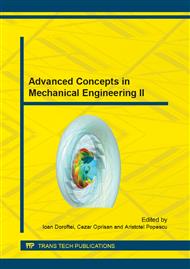p.157
p.163
p.171
p.177
p.183
p.189
p.195
p.201
p.205
Theoretical and Experimental Researches Regarding the Use of Butanol at Diesel Engine
Abstract:
Due to the increasing growth of fuel consumption and also its price, alcohols begin to show a real interest for their use as fuel at compression ignition engines. Tightening the requirements on reducing the level of pollutant emissions and greenhouse effect gases has led to the increasing of research on using alcohols as alternative fuel for diesel engine. Among the primary alcohols, butyl alcohol (butanol) is considered to be of great perspective in its use as fuel in diesel engines, due to its properties close to those of diesel fuel. The overall objective of the paper represents using butanol at an automotive diesel engine in order to reduce BSFC, to reduce engine emissions and replace fossil fuels. This paper presents some aspects of the operation of diesel engine fuelled with blends of diesel fuel and butanol. Results of theoretical and experimental investigations done on a 1.5 L diesel engine fuelled with butanol are presented. At the use of butanol in mixture with diesel fuel in different proportions (10% and 20% butanol vol.), brake specific energetic consumption of the engine was reduced by about 2.5% and respectively 5%, NOx emissions decreased by about 15% and respectively 20%, CO2 emission by about 5% for 20% butanol, at the engine running at full load and maximum torque engine speed. The results of experimental investigations have validated the physical-mathematical model used for the simulation of thermo-gas-dynamics processes from the inside engine cylinder. The paper brings real contributions in the field making available to specialists new information related to the use of butanol at the diesel engines.
Info:
Periodical:
Pages:
183-188
DOI:
Citation:
Online since:
October 2014
Keywords:
Price:
Сopyright:
© 2014 Trans Tech Publications Ltd. All Rights Reserved
Share:
Citation:


